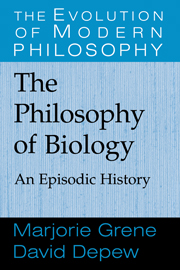Book contents
- Frontmatter
- Contents
- List of Figures
- Notes on Citations and References
- Acknowledgments
- Preface
- 1 Aristotle and After
- 2 Descartes, Harvey, and the Emergence of Modern Mechanism
- 3 The Eighteenth Century I
- 4 The Eighteenth Century II
- 5 Before Darwin I
- 6 Before Darwin II
- 7 Darwin
- 8 Evolution and Heredity from Darwin to the Rise of Genetics
- 9 The Modern Evolutionary Synthesis and Its Discontents
- 10 Some Themes in Recent Philosophy of Biology
- 11 Biology and Human Nature
- 12 The Philosophy of Biology and the Philosophy of Science
- References
- Index
4 - The Eighteenth Century II
Kant and the Development of German Biology
Published online by Cambridge University Press: 05 June 2012
- Frontmatter
- Contents
- List of Figures
- Notes on Citations and References
- Acknowledgments
- Preface
- 1 Aristotle and After
- 2 Descartes, Harvey, and the Emergence of Modern Mechanism
- 3 The Eighteenth Century I
- 4 The Eighteenth Century II
- 5 Before Darwin I
- 6 Before Darwin II
- 7 Darwin
- 8 Evolution and Heredity from Darwin to the Rise of Genetics
- 9 The Modern Evolutionary Synthesis and Its Discontents
- 10 Some Themes in Recent Philosophy of Biology
- 11 Biology and Human Nature
- 12 The Philosophy of Biology and the Philosophy of Science
- References
- Index
Summary
Introduction
Although Immanuel Kant produced an important body of occasional writing about biological topics to which we will turn more explicitly at the end of this chapter, the bulk of his work on the philosophical aspects of biology can be found in the section of the Critique of Judgment entitled “Critique of Teleological Judgment” (Kant 1790; 2nd ed. 1793). Kant reflects there on the key philosophical issues in the life sciences, especially teleology and reductionism. It must be conceded that these issues were not central to Kant's lifework, and that they play only a supporting role in the overall line of argument of the Critique of Judgment itself. Nonetheless, Kant's ideas about the central questions of biological inquiry were influenced by, and in turn influenced, practicing biologists in early nineteenth-century Germany, as well as later philosophers. Indeed, some of those with whom Kant interacted, especially Johann Friedrich Blumenbach, were at that very time laying the foundations of the modern science of biology. For these reasons, Kant deserves a place in a history of the philosophy of biology.
Organisms as Natural Purposes
On its theoretical side, Kant's critical philosophy was an effort to demonstrate that the logical forms inherent in the very act of thinking (like the subject-predicate, if-then, and other such relationships) correspond to categories into which our objective experience – our experience of objects – falls. Our experience can be objective only because this conjunction of sensible matter and categorical form occurs.
- Type
- Chapter
- Information
- The Philosophy of BiologyAn Episodic History, pp. 92 - 127Publisher: Cambridge University PressPrint publication year: 2004

